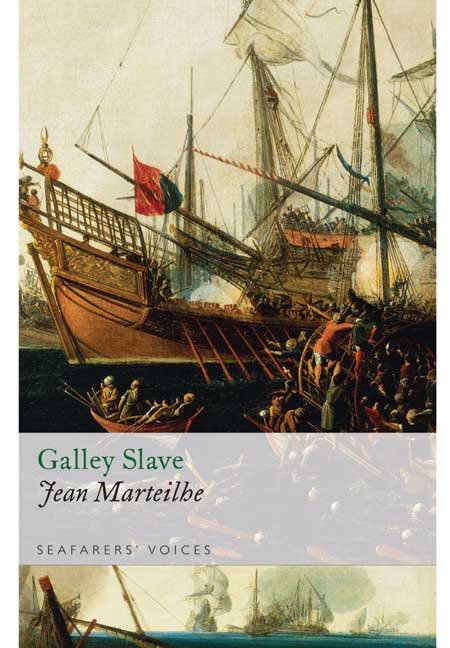Seafarers' Voices 1: Galley Slave (ePub)
The Autobiography of a Protestant Condemned to the French Galleys

Series: Seafarers' Voices
File Size: 696.7 KB (.epub)
Pages: 224
ISBN: 9781783468683
Published: 14th June 2010
This remarkable memoir tells of the miseries of Jean Marteilhe of Bergerac, ‘a Protestant condemned to the Galleys of France for his Religion’, who, after the revocation of the Edict of Nantes in 1685, attempted, like so many French Huguenots, to escape to the more sympathetic Protestant countries bordering France. In 1700, heading through the Ardennes towards Charleroi, he was captured by French Dragoons and thrown into gaol.
In 1707 he then found himself, like so many Huguenots, condemned to serve in the French Mediterranean galleys. Little is known of life as a galley slave on these oared vessels. Certainly no accounts have come down to us from ancient Greece or Rome, though a little is known from the time of the Crusades. So Marteilhe’s racy account represents the only authentic record of the miseries of a galley slave who experienced all the horrors of ‘whips and chains’ and the dreaded ‘bastinado’ - foot whipping.
For six years he pulled his oar, often seeing friends and co-religionists lashed - sometimes to death - under the whips of the overseers. He himself sustained almost fatal injuries in a bloody engagement with the British off the mouth of the Thames before being released under a general amnesty in 1713.
Galley Slave brings vividly to life the sufferings and conditions on the seventeenth- and eighteenth-century galleys and is a unique and unforgettable account.
JEAN MARTEILHE was born in 1684 into a Huguenot family, just one year before the revocation of the Edict of Nantes. Captured while trying to leave France in 1700, he was to be subjected to six years as a galley slave. He published his memoir France in 1757 and died in Holland in 1770.
A fascinating piece of reasonable recent history. Seaforth are to be congratulated for reproducing such an important work.
Work Boat World
This account by Jean Marteilhe, a Huguenot enslaved aboard French galleys from 1700 to 1713, is an excellent choice of text to begin the publisher’s new “Seafarers’ Voices” series.
Allan James, International Journal of Maritime History
In a brief, useful introduction by Vincent McInerney setting out the political context of Marteilhe’s arrest and incarceration, including the history of Huguenot persecution in France, a concise overview of the galley in naval warfare provided.
…although the harshness of life as a galley slave is the predominant theme, it is not just this, nor simply a gripping tale that is on offer. This is a fascinating insight into the nature of galley warfare in general and an interesting perspective on the maritime side of the War of the Spanish Succession in particular.
The book has been edited and, with an introduction by Vincent McInerney, it tells the memoirs of Jean Marteile, a Protestant condemned to the galleys of France for his Religion. This is a remarkable diary of the extraordinary accounts of torture, whippings, beatings and the general appalling on-board conditions the slaves experienced at the hands of other religious fanatics. It is a harrowing read but well worth it! This is the first of four in a series "Seafarers Voices". In this first brilliant book, it certainly bodes well for the others.
The Nautical Magazine - Jul-Dec 2010
This is an abridged version of the autobiographical memoirs of a Protestant Jean Marteilhe (1684-1777) condemned to the galleys in 1707, which give us an authentic view of the life endured by so may. Like other French Hugenots after the revocation of the Edict of Nantes in 1685, he tried to escape to neighbouring countries but he was captured by French dragoons and thrown into gaol. He was a prisoner on land and sea. Unwilling to compromise his principles for expediency he was subjected to a life of harrowing slavery which he describes vividly. He tells an exciting tale of misadventure, violence and intrigue.
Historical Association, Autumn Book Reviews
He describes the appalling onboard conditions, the horrors of 'whips and chains', and the dreaded 'bastinado'. He was released under a general amnesty in 1713. In the meantime he had pulled his oar in the Mediterranean and often witnessed friends and co-religionists being whipped, sometimes to death.
The memoir was first translated into English in 1758 by 'James Willington', a pseudonym for Oliver Goldsmith (1730-1774), who possibly found it on a walking tour on the Continent at Leiden the author's base in 1756.
This, the first item in the Seafarer's Voices series, is based on the 1765 Dublin edition which has end-notes by Marteilhe himself. In place of 80,000 words the abridgement has 40,000 omitting theological and political issues of little interest to the modern reader.



















